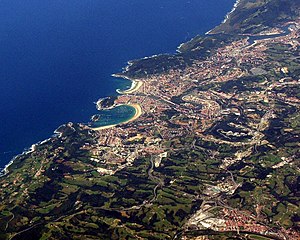San Sebastian, Spain
|
San Sebastián Donostia (Basque) |
|||
|---|---|---|---|
| Donostia / San Sebastián | |||

San Sebastián as seen from the air
|
|||
|
|||
| Motto: Ganadas por fidelidad, nobleza y lealtad (Spanish for "Earnt by fidelity, nobility and loyalty") |
|||
| Location of San Sebastián within the Basque Autonomous Community | |||
| Coordinates: 43°19′17″N 1°59′8″W / 43.32139°N 1.98556°WCoordinates: 43°19′17″N 1°59′8″W / 43.32139°N 1.98556°W | |||
| Country |
|
||
| Autonomous community |
|
||
| Province | Gipuzkoa | ||
| Comarca | Donostialdea | ||
| Neighbourhoods | 21 | ||
| Founded | 1180 | ||
| Government | |||
| • Mayor | Eneko Goia Laso (EAJ-PNV) | ||
| Area | |||
| • Land | 60.89 km2 (23.51 sq mi) | ||
| Elevation | 6 m (20 ft) | ||
| Population (2015) | |||
| • Total | 186,095 | ||
| • Density | 3,686.16/km2 (9,547.1/sq mi) | ||
| Time zone | CET (UTC+1) | ||
| • Summer (DST) | CEST (UTC+2) | ||
| Postal codes | 20001–20018 | ||
| Area code(s) | 34 + 943 (Gipuzkoa) | ||
| Website | City Council | ||
San Sebastián (Spanish: [san seβasˈtjan], French: Saint-Sébastien) or Donostia (Basque: [doˈnos̺tia]) is a coastal city and municipality located in the Basque Autonomous Community, Spain. It lies on the coast of the Bay of Biscay, 20 km (12 miles) from the French border. The capital city of Gipuzkoa, the municipality's population is 186,095 (2015), with its metropolitan area reaching 436,500 (2010). Locals call themselves donostiarra (singular), both in Spanish and Basque.
The main economic activities are commerce and tourism, and it is one of the most famous tourist destinations in Spain. Despite the city’s small size, events such as the San Sebastián International Film Festival have given it an international dimension. San Sebastián, along with Wrocław, Poland, was the European Capital of Culture in 2016.
In spite of appearances, both the Basque form Donostia and the Spanish form San Sebastián have the same meaning of Saint Sebastian. The dona/done/doni element in Basque place-names signifies "saint" and is derived from Latin domine; the second part of Donostia contains a shortened form of the saint's name. There are two hypothesis regarding the evolution of the Basque name: one says it was *Done Sebastiáne > Donasa(b)astiai > Donasastia > Donastia > Donostia, the other one says it was *Done Sebastiane > *Done Sebastiae > *Done Sebastie > *Donesebastia > *Donasastia > *Donastia > Donostia.
...
Wikipedia



